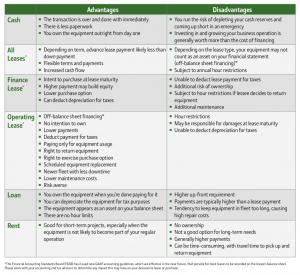When acquiring agricultural machinery for your farm, there are many factors that need to be taken into consideration. You need to spend time assessing the worth of the machine you are thinking about buying in order to determine whether it is going to be truly profitable. If you believe it is, you then need to compare all of the machines and brands against one another. This can be an extensive process when you consider the huge variety of machines and farming brands available today. Nonetheless, before you even begin to take all of this into account, the first thing you need to decide is whether you should lease the machine or purchase it outright.
There is no overall right or wrong answer when it comes to this choice. It is all about finding what works the best for your situation specifically. Here’s a look at both options in further detail in order to help you come to the right decision.
Purchasing farm machinery
First and foremost, let’s begin with purchasing farm machinery outright. This is the option most farm owners tend to go for. Why? Because they then have ownership of the machine and have something to show for the money spent. And if this is a machine you are going to use frequently, it tends to be more cost effective in the long run to purchase the agricultural machinery in question. Not only this, but it can be beneficial for building equity.
Speaking of equity, when opting to go this route, most farmers and farm managers will use equity or they will borrow money to finance machine purchases. Not only does the cost of the machine need to be considered, but if you own it you will also be responsible for all other payments. This includes everything from plans from a farm insurance broker to taxes to repair costs that are not included in the warranty, such as general maintenance.
This link from Iowa State is one of the best explanations that explains with simple worksheets and mathematical equations where you can see exactly how much new or used equipment will cost as a per-hour or per-acre breakdown. (“Breakdown,” Pun intended?). The average piece of farm equipment lasts between 10 and 15 years, so the many variables need to be taken into consideration. Learn more about when and how to replace ag equipment here.
Leasing farm machinery
What about leasing it instead? This is ideal for those who do not have the start-up costs to afford to purchase a machine outright. If you only require a machine for a set period of time or if you are unsure whether purchasing it would be worthwhile, leasing is a great solution.
A benefit to this is a lighter debt, load and this can be a good option for beginning farmers. Farm equipment tends to depreciate quickly, but on the other hand, you don’t build equity when you don’t have ownership of the equipment. The list below from John Deere further explains the pros and cons of leasing with points to consider … what are the hour restrictions on your lease? What if your machinery ends up damaged or scratched; how will that effect the lease?

So, what exactly is a lease? This is a long-term contract between you and the owner of the machine. The contract permits you to use the machine for the length of time stated as long as you make the payments that have been outlined. The contract tends to last between three and five years, and people who go this route usually have the option to pay monthly, quarterly, yearly, or, in some instances, upfront. It is worth noting that cancellation of the lease can result in a penalty. Exact terms may vary depending on the dealer, but this other Iowa State link will further dive into the thorough checklist to see if leasing is right for you.
Hopefully these tips give you some insight as to which option is better for you, and of course, it’s always a good idea to have good working relationships with your local implements and banker. As mentioned, there is no right or wrong answer, and either option may offer benefits for tax purposes. It is all about finding the right solution in relation to your situation and your needs specifically. In fact, a lot of farmers go for a lease and ultimately buy a machine. This means they lease the machine, and at the end of the contract, they have the option to purchase it. The lease payments they have made will be deducted off the total price of the machine if they do buy it, similar to a car. All personal preference but hopefully this gives you a little better idea of options and what to expect.
Michelle Miller, the Farm Babe, is an Iowa-based farmer, public speaker, and writer, who lives and works with her boyfriend on their farm, which consists of row crops, beef cattle, and sheep. She believes education is key in bridging the gap between farmers and consumers.



